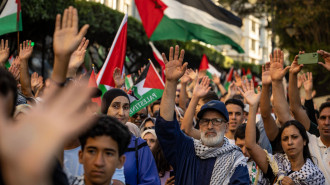Aid group calls for migrant evacuations from Tripoli
Aid group Doctors Without Borders urged the evacuation of thousands of migrants trapped in detention centres in Libya's capital Tripoli, which is under a fragile ceasefire after deadly clashes.
The ceasefire brokered by the United Nations was agreed between armed groups Tuesday after at least 63 people were killed in days of fighting around the city.
Doctors Without Borders, also known under its French name Medecins Sans Frontieres (MSF), said migrants in squalid detention centres close to the frontline could yet come under shelling and artillery fire.
Analysts say the ceasefire is doomed without a sustainable political agreement between the myriad armed groups.
Ibrahim Younis, MSF's mission chief in Libya, said food supplies to the detention centres were sparse as international groups had been forced to suspend their work due to the clashes.
The charity has been completely cut off from one of the most crowded detention centres, depriving some 700 people of aid, and has pulled some staff from the city.
Last week, the UN's refugee agency, the UNHCR, said it had "evacuated" some 300 migrants from the Ain Zara detention centre to another a few kilometres away as they risked getting caught in the crossfire.
But Younis said this was not good enough.
"Moving endangered refugees and migrants from one detention centre to another in the same conflict zone cannot be described as an evacuation and it is certainly not a solution," he said in a statement.
The aid group called on the UNHCR and the governments of peaceful countries to organise a mass evacuation for the migrants, who could then claim asylum.
The International Organisation for Migration could arrange for those seeking to return home to do so, MSF said.
The group also called on the European Union and Libyan authorities to stop blocking boatloads of migrants seeking to flee the conflict-torn country, "with the goal of reducing arrivals to Europe at all costs".
Some 8,000 people picked up by the Libyan coastguard while trying to cross the Mediterranean to Europe are being indefinitely held in detention centres, according to the UNHCR.
EU countries have offered support and training to the Libyan coastguard in a bid to stem the influx of migrants to Europe.
Sub-Saharan African migrants have suffered appalling abuses since Libya descended into chaos following the death of dictator Muammar Gaddafi in 2011.
Meanwhile, the UN envoy for Libya warned the country has lurched from one emergency to another in recent weeks and warned that militant groups, including the Islamic State group is expanding its operations, noting Libya could become a refuge for terrorist groups of all persuasions.
Ghassan Salame urged council members to help address the "looming threat" from the spread of extremist groups, and support economic reforms and efforts to advance the political process and move toward national elections.
Salame said violence that consumed the capital starting August 26 "shattered the facade of calm that had prevailed in Tripoli since May 2017." Tanks and heavy artillery were deployed in residential neighbourhoods leaving 61 Libyans dead and nearly 160 injured, many of them civilians including children, he said.
Tripoli was "on the brink of all-out war" until the UN brokered a fragile cease-fire between the major parties on Tuesday which it is now trying to help take root as a first step toward peace, he said.
"This crisis is but the latest in a series of crises that have engulfed Libya," Salame stressed.
He pointed to events in Libya's oil-rich crescent in June and July that "effectively threatened to split the country," the Islamic State's expanding presence and operations, and over 1,000 Chadian government and opposition forces fighting in recent weeks from bases in southern Libya.
This risks "the south becoming a regional battleground and safe haven for foreign armed groups," he said.

![Palestinians mourned the victims of an Israeli strike on Deir al-Balah [Getty]](/sites/default/files/styles/image_684x385/public/2024-11/GettyImages-2182362043.jpg?h=199d8c1f&itok=xSHZFbmc)


![The law could be enforced against teachers without prior notice [Getty]](/sites/default/files/styles/image_684x385/public/2178740715.jpeg?h=a5f2f23a&itok=hnqrCS4x)
 Follow the Middle East's top stories in English at The New Arab on Google News
Follow the Middle East's top stories in English at The New Arab on Google News


![Left-wing candidate Jill Stein campaigns in Michigan in October [Getty]](/sites/default/files/styles/image_330x185/public/2024-11/GettyImages-2176828619.jpg?h=199d8c1f&itok=h2FXzBuP)